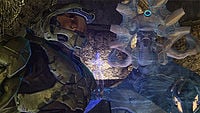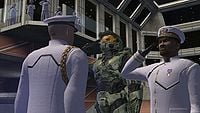SPARTAN-II program: Difference between revisions
From Halopedia, the Halo wiki
No edit summary |
No edit summary |
||
| Line 1: | Line 1: | ||
{{Era|FOR|TF|FS|GOO|HGN|UP|H1|H2|H3|HW}} | {{Era|FOR|TF|FS|GOO|HGN|UP|H1|H2|H3|HW}} | ||
[[Image:SPARTAN-II.jpg|thumb|Three SPARTAN-II Soldiers in 2531]]{{ | [[Image:SPARTAN-II.jpg|thumb|Three SPARTAN-II Soldiers in 2531]]{{Infobox Military Unit | ||
}} | |||
[[Image:Fall of Reach.jpg|thumb|Four SPARTAN-II Soldiers in 2552]] | [[Image:Fall of Reach.jpg|thumb|Four SPARTAN-II Soldiers in 2552]] | ||
[[Image:Goingtoactivatehalo.JPG|thumb|SPARTAN-117: John, the most famous SPARTAN]] | [[Image:Goingtoactivatehalo.JPG|thumb|SPARTAN-117: John, the most famous SPARTAN]] | ||
Revision as of 22:57, February 17, 2008
Template:Infobox Military Unit
The SPARTAN-II Program was part of the SPARTAN Program, an effort to produce shoot first, ask questions later elite soldiers through biological augmentation. The SPARTAN-II program would be the first in the series to meld advanced mechanical technology with the troopers' superior physiques.
History
Origins
Projections calculated by the UNSC Office of Naval Intelligence concluded that by 2525 the instability of the outer colonies would result in widespread rebellions unless drastic military measures were instituted. The SPARTAN-II program would meet these requirements, creating a small group of elite soldiers meant to subdue insurrections in their infancy with precision strikes. In this way, civilian casualties might be minimized, civil war averted, and costly conventional solutions made unnecessary.
The project was led by Dr. Catherine Halsey of ONI's Section 3 and Chief Petty Officer Mendez of the UNSC armed forces. Candidates for the program were selected from children deemed to possess superior physical and mental attributes. By 2517 150 suitable candidates had been identified, but for budget reasons only half that number were "conscripted". Most were between 5 and 7 years old. To preserve the program's secrecy the children were replaced by flash clones which would die soon thereafter due to numerous medical complications associated with flash-cloning an entire human being.
Taken to Reach these child-soldiers began training under CPO Mendez. To marginalize the civilian lives they had once led their names became a combination of their given names and a number (like "John-117"), with family names being discarded. Seven years later they began receiving the physical augmentations that would ultimately make them Spartans. The procedures were risky and nearly half died as a result. A small number survived but some were physically crippled (such as SPARTAN-084), and these were discharged from the program and placed in non-combat positions where their enhanced mental faculties might still prove useful. Only 33 survived without complications and, now much improved, remained fit for combat duty.
2525 would see the fulfillment of the program when the survivors were fitted with the MJOLNIR Mark IV Powered Assault Armor.
The Human-Covenant War
The conflict with the Covenant marked a change in the objectives of the program. Originally intended to quell rebellions the Spartans were now forced into battle against an opponent much superior to the UNSC. Although on an individual basis the Spartans were to frequently demonstrate their superiority over the enemy, the scope of their stunning successes was frequently only tactical in nature. Nonetheless, heroic rearguard and delaying actions saved countless human lives from the genocidal Covenant campaign. During the Covenant campaign it was decided to make the Spartan-II project public, in an effort to boost morale.
Inevitably the small number of SPARTAN-IIs dwindled as casualties were sustained. As the exploits of the Spartans was a major propaganda boon to the UNSC , Section Two of ONI issued Directive 930 stating that Spartans killed or crippled would be listed as "missing in action" or "wounded in action", thus maintaining the illusion of Spartan invincibility.
In late-2552 all except three of the remaining Spartans rendezvoused at Reach to receive new orders for an operation that HIGHCOM hoped would end the war. They would commandeer a Covenant vessel, locate the Covenant "homeworld", and return with captured Covenant leadership. To this end the Spartans were slated to be re-equipped with MJOLNIR Mark V suits. The A.I. Cortana, carried within John-117's armor, would serve as the strike force's hacker and technology specialist.
However, all preparations were interrupted (and subsequently canceled ) by the Covenant assault on Reach. In the ensuing disaster most of the SPARTAN-IIs were killed. Two escaped (one was technically dead but later revived), aboard the UNSC Pillar of Autumn, while the rest remained trapped on Reach.
Following the events at Alpha Halo the Spartans were reunited at Reach. They then carried out a strike that resulted in the destruction of a Covenant fleet anchorage which contributed to the UNSC victory at the First Battle of Earth. SPARTAN-IIs would go on to play pivotal roles at the Battle of Onyx and the Second Battle of Earth.
The Spartan-IIs were sent on many missions such as the one were John-117 ,Kelly-087, Samuel-034 ,and many others were sent on a mission to destroy a covenant Ship. Samuel-034 got hit with a Plasma bolt by a jackal early in the mission. When they had to plant the explosives and jump into space, John told Sam to stay be hind instead of decompressing in space. Sam died but was probably recommended for the Silver Star or Medal of Honor.
Technology
Biological Augmentation
- Main article: SPARTAN-II Augmentation Procedures
Admiral Ysionris Jeromi of the research station Hopeful documented the following experimental procedures on Bonobo Chimpanzees. These operations were later performed on the Spartan soldiers:
- Carbide ceramic ossification: The grafting of advanced materials onto the skeletal structure to make bones almost unbreakable. If coverage exceeded 3 percent of the total bone, mass white blood cell necrosis was common. In adolescents, growth spurts could result in bone pulverization.
- Muscular enhancement injections: An intra-muscular injection of a protein complex to increase tissue density and decrease lactose recovery time. Increased the risk of a fatal cardiac volume increase.
- Catalytic thyroid implant: The implantation of a platinum pellet in the thyroid containing human growth hormone catalyst. This boosted growth of skeletal and muscle tissues. It was known to suppress the sexual drive and cause elephantiasis
- Occipital capillary reversal: Increased blood vessel flow beneath the rods and cones of the retina. Increases visual perception. Known to cause retina rejection and detachment, as well as permanent blindness.
- Superconducting fabrication of neural dendrites: Altered the bio-electrical nerve trans-duction to shielded electronic trans-duction. Resulted in a 300 percent increase in reflexes. Showed evidence of an increase in intelligence, memory, and creativity. Often caused Parkinson's disease and Fletcher's syndrome.
MJOLNIR Armor
- Main article: MJOLNIR armor
The SPARTAN-II program was conceived in parallel with the development of the MJOLNIR armor. The Spartans received the first practical forms of the armor, the Mark IV, in 2525, followed by the Mark V and Mark VI in 2552.
The demands of the armor was such that only the Spartans could wear them. A number of baseline humans were killed attempting to use the suit during test trials.
Background
Surviving SPARTAN-IIs
The identities of the Spartans' full names have been deleted from the military records. These are the tags of all known Spartans, and their current status.
Beginning of SPARTAN-II("First" Spartans) originally selected 150 potential candidates, however there was only funding for half that number, so the Spartan candidates were further scrutinized, producing 75 "test subjects."
SPARTAN-II("Second" Spartans) are these 75 "test subjects."
SPARTAN-II: 2525
- SPARTAN-008: Li - Confirmed KIA by Covenant Plasma Torpedo
- SPARTAN-029: Joshua - MIA/KIA
- SPARTAN-030: Vinh - MIA/KIA
- SPARTAN-034: Samuel - Confirmed KIA, first to actually destroy a Covenant ship in a non-ship to ship battle
- SPARTAN-039: Isaac - MIA/KIA during Battle of Reach
- SPARTAN-043: William - Confirmed KIA by Hunter pair during Battle of Onyx
- SPARTAN-044: Anton - Confirmed KIA by Covenant Plasma Torpedo
- SPARTAN-051: Kurt - Confirmed KIA along with a Zealot Elite by a nuclear detonation during Battle of Onyx
- SPARTAN-058: Linda - Active on Onyx
- SPARTAN-059: Malcom - Confirmed KIA during Battle of Reach
- SPARTAN-062: Maria - Retired
- SPARTAN-084: Fhajad - Discharged
- SPARTAN-087: Kelly - Active on Onyx
- SPARTAN-093: Grace - Confirmed KIA During Battle On Unyielding Heirophant
- SPARTAN-104: Frederic - Active on Onyx
- SPARTAN-117: John - MIA (In reality Active, but in cryostasis, on the aft section of the Forward Unto Dawn)
- James - MIA/KIA
- Kirk - Discharged
- Rene - Discharged
- Cassandra - WIA
- Randall - MIA
- Sheila - Confirmed KIA during Battle of Miridem
- Gray Team - MIA
-Spartan Group Omega - Unknown
However Spartans are only recorded as MIA, even if there are eyewitnesses to their deaths. This maintains the morale of soldiers and the rumor that Spartans never die.
"No Spartan could be listed KIA, only MIA. This is so it could be said that no Spartan was ever killed in combat." - Unknown UNSC officer.
SPARTAN-II: 2537
According to the I Love Bees story line some Spartans were drafted or conscripted into the Spartan program eleven years after the second class of Spartans-IIs graduated.[1] The only known Spartans from this third class are:
- Yasmine - Killed in Augmentation
- Nicole-458 - Trapped in the 21st Century (non-canon)
SPARTAN-II: 2547
While Spartan's were previously something of legend, Section Two decided to begin public promotion of the Spartan-II program in 2547 in order to boost morale during the Human-Covenant War. It should also be noted that only the Spartan-II Program was public promoted, while the existence of the Spartan-III Program continued to remain strictly confidential. [2]
Last known surviving Spartans IIs
The last known surviving Spartan IIs are:
- John-117
- Kelly-087
- Fred-104
- Linda-058
- Maria-062(from the Halo: Graphic Novel story Armor Testing, retired)
- Members of the conspicuous Gray Team and those of class 3 still remain as well.
A number of SPARTAN-IIs disappeared under dire circumstances and are presumed dead. However, since nobody witnessed their final fate it is possible they may reappear later. Some of those that fit into this category are: Anton-044, Spartan-James (number unknown), Joshua-029, Isaac-039 Li-008 and Vinh-030.
There is also some confusion concerning the number of SPARTAN-IIs in general. In Halo: The Fall of Reach it is cited that 68 children were in the program two years after its initiation out of 75 that were originally drafted. No mention is made of the whereabouts of the missing 7. After the augmentation process all 75 reappear, with 33 being successfully upgraded, 12 surviving but being crippled, and 30 being killed as a result of the procedures.
The status of SPARTAN-IIs is muddied further in the novels. For example, Kurt-051 is listed as dead in 2531 when in reality he was drafted into the secret SPARTAN-III Program until his real death in 2552 on Onyx. Further ambiguity arises from page 260 of Halo: The Fall of Reach where three Spartans, designated "Gray Team", were said to have been on "fields of battle too distant to be easily recalled" prior to the Battle of Reach. Their fates remain unresolved as in Halo: Ghosts of Onyx these three were said not to have been heard from for a year. Finally, it is not certain whether Cassandra is a Spartan or not.
Bungie has said that these discrepancies only seem to be errors, and that everything will be made clear in time.
It is said that John-117 was the only Spartan to return from Reach without life threatening injuries.
Trivia
- The SPARTAN-IIs, in MJOLNIR Mark V, have a reaction time of approximately 4 milliseconds and can lift around twelve times the body weight of a normal person, according to Halo: The Fall of Reach.
Sources
- ^ http://transmit.ilovebees.com/outbound/zero_motor_function.wav
- ^ Nylund, Eric. Halo: Ghosts of Onyx. New York: Tor, 2006. Pg. 139.
| |||||||||||||||||
| ||||||||


